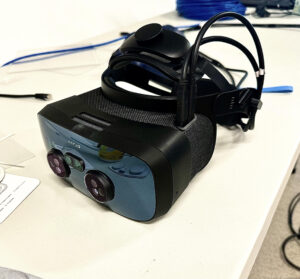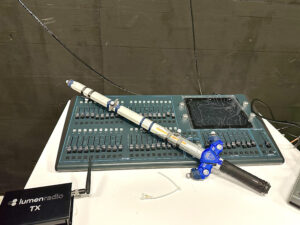

Humber seeks to push new tech with new program
Business & TechHumberNews Oct 22, 2023 Oleksandra Chorna

Humber is running a new graduate certificate program, aiming to help students practically use technologies.
Dubbed “Interactive Media Management — Creative Technologies,” the program is expected to run for three semesters — including the current one — and is based at North Campus. Most classes are held at the Barett Centre.
According to David Neumann, a professor for the Faculty of Media and Creative Arts at North, the idea for this initiative came from faculty members.
“They identified the need for better understanding and more immersion into emerging technologies that wasn’t possible at the undergrad level,” he says.
Neumann says the program is looking, among other things, at technologies such as Virtual Reality (VR), Artificial intelligence (AI), Augmented Reality (AR), Internet of Things (IOT) and 3D printing, helping students navigate those innovations and learn how to apply them in the field.
Neumann says the diversity in students’ backgrounds, which range from architects to lawyers, helps further the development of the program since people learn how to use new technologies across several different industries.
“They’re thinking about how an architect for example can incorporate drones in his work. Or how a designer can use prototyping for his advertisements. So they’re not just learning about all these software, but acquire practical skills like prototyping, designing, flying drones and coding,”, says Neumann.
His colleague, Ahmed Raza Sagarwala, the associate dean of Interactive Design, adds that the program will also help students to come up with creative solutions for industry problems in their future careers.
“Let’s just say we have a problem in healthcare. Maybe it has to do with tracking rooms that need to be cleaned and prepped for the next patient, which is actually one of the challenges we have in our healthcare system today. We could look at how the room has been operated, and how the cleaning staff and the nurses and the doctors used that room. And then we can find ways of tracking when the cleaning crew comes in and comes out of the room by using active or passive tracking. That’s how we can assume when the room is ready for use. And that’s a creative solution using technologies,” says Sagarwala.
He says in order to encourage students to solve diverse types of issues through technology, the program works with other programs both at North and at Lakeshore.
“We work with a culinary arts program, forensic sciences, funeral services, law program. So what we do is identify a need they have and search for a creative technological solution for it,” says Sagarwala.
He says it can range from helping criminologists to virtually create a crime scene, to help them learn how to behave there to building a relaxing space for students on campus to get some rest.
Structurally, each semester of the program is 14 weeks long. Every two or three weeks students learn a new technology and get to practice with it.
Students themselves are excited for the initiative.
“We live in a digital age, new technologies are everywhere right now. Even when you’re applying for a job, they’re sometimes looking for digital projects on your portfolio. So I’d like to take a program like this in the future,” says Ayantika Chatterjee, a first-year Business Analytics student at Humber.
Her friend Swathi Ganesan, who’s also in Business Analytics, says she is interested in further learning about technologies as well.
“During my previous education, I had workshops based on VR and IOT, so I’m interested in in-depth learning of it.”
The program will be evaluated this year and next year. If it’s successful, it could be added to the college course list permanently.


